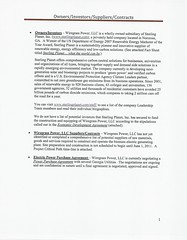 We are the media, and you can be, too!
We are the media, and you can be, too!
According to the OPEN Government Act of 2007:
[T]he term ‘a representative of the news media’ means any person or entity that gathers information of potential interest to a segment of the public, uses its editorial skills to turn the raw materials into a distinct work, and distributes that work to an audience. In this clause, the term ‘news’ means information that is about current events or that would be of current interest to the public. Examples of news-media entities are television or radio stations broadcasting to the public at large and publishers of periodicals (but only if such entities qualify as disseminators of ‘news’) who make their products available for purchase by or subscription by or free distribution to the general public. These examples are not all-inclusive. Moreover, as methods of news delivery evolve (for example, the adoption of the electronic dissemination of newspapers through telecommunications services), such alternative media shall be considered to be news-media entities.
Here is the bill’s full text. The bill was sponsored by Sen. Patrick Leahy and 17 others, ranging from Sen. Barack Obama to Sen. Johnny Isakson. It was signed into law by President George W. Bush 31 December 2007.
![]() Of course that’s really just a detail, having to do with the
Wikileaks comparison.
Of course that’s really just a detail, having to do with the
Wikileaks comparison.
Most of what LAKE does has more to do with Georgia law, about open records requests and this passage, O.C.G.A. § 50-14-1-c.:
“Visual, sound, and visual and sound recording during open meetings shall be permitted.”
None of that requires a news medium. Any citizen can file open records requests or record public meetings. Remember, you are the media!
-jsq for
![]() LAKE, the Lowndes Area Knowledge Exchange
LAKE, the Lowndes Area Knowledge Exchange









